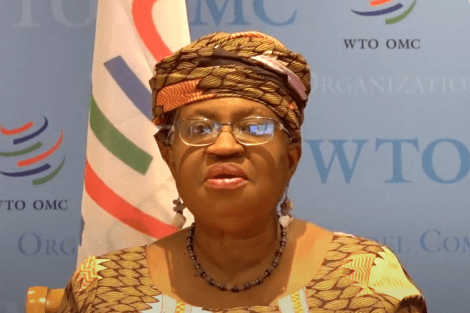At nursing leadership event, speakers cite critical role for nurses in vaccination campaigns, call for vaccine equity among wealthy and developing nations
May 5, 2021 – Nurses and nursing leaders can play a significant role in supporting the rollout of the COVID-19 vaccine in countries in the developing world, according to Ngozi Okonjo-Iweala, director-general of the World Trade Organization.
Throughout history, nurses have played a key role in advocating for and in delivering vaccines, said Okonjo-Iweala in her keynote address at an April 29, 2021, virtual workshop on “Vaccine Equity in the Time of Pandemics: The Role of Nurses in Vaccination Programs.”
The event marked the launch of the Harvard Global Nursing Leadership Program, a joint effort of Harvard T.H. Chan School of Public Health, Harvard Kennedy School, Harvard Graduate School of Education, and the Africa Centres for Disease Control and Prevention (Africa CDC). The program is aimed at giving ministry-level nurses and midwives a foundational understanding and field experience in global public health and population health management.
Okonjo-Iweala said that vaccine equity is not just a moral imperative, but a strategic and economic imperative. Noting that countries have not been working together to ensure fair distribution of the vaccine, she said, “States acting in their own perceived self-interest are in fact acting in no one’s interests. The consequences will come back to haunt them—and all of us. If wealthy countries vaccinate their populations, but poor countries with limited access to vaccines are left out, the cost to the global economy will exceed $9 trillion. Wealthy countries will bear half those losses. Economic stagnation will continue, with worldwide repercussions.”
Once the access problems are solved, the world can turn to getting vaccines into arms—which is where nurses can help, said Okonjo-Iweala. Nurses can raise awareness about the vaccines, communicate effectively to drive out fear and hesitancy, and help with vaccine administration, prescribing, and policy development, she said.
Watch a video clip of Ngozi Okonjo-Iweala’s keynote address
Sheila Tlou, former minister of health in Botswana, former regional director of UNAIDS, and current co-chair of the Nursing Now Campaign, echoed Okonjo-Iweala’s sentiments. “In my work as co-chair of the Nursing Now initiative, I see firsthand the many ways in which nurses are key to getting people vaccinated,” she said. “Nurses lead campaigns, they teach, they educate, they drive out miscommunication and stigma.” She also recalled how nurses were at the forefront of Botswana’s successful response to HIV and AIDS.
Tlou moderated a panel discussion that focused on ways to ensure vaccine equity and support nursing leaders in their role in the COVID-19 vaccination campaign. Panelists included Harvard Chan School Dean Michelle Williams; John Nkengasong, director of the Africa CDC; Muhammad Pate, global director, health, nutrition and population at The World Bank, director of the Global Financing Facility for Women, Children and Adolescents, and Julio Frenk Professor of the Practice of Public Health Leadership at Harvard Chan School; and Shirley Baines, CEO of the Burdett Trust for Nursing. The panel was introduced by Stephanie Ferguson, visiting fellow in the Department of Health Policy and Management and director of the Harvard Global Nursing Leadership Program.
“One of the things that COVID-19 has taught us is that we do need nursing. We actually need more nursing leaders and more nurses right now if we want to effectively control this outbreak,” said Williams. She noted that the World Health Organization has predicted a shortage of nearly 6 million nurses worldwide by 2030. “The bottom line is … we have to invest in capacity building. We must invest in nursing education. We must create a stronger, more robust work force that has the resilience and the capacity, as well as the leadership skill, to manage these threats [at] scale.”
The workshop also featured a session on the Global Nursing Leadership Program and its curriculum design. More than 80 nursing and midwifery leaders and other key partners from 20 countries attended the event.
Read a press release about the Harvard Global Nursing Leadership Program: Three Harvard schools and Africa CDC launch inaugural global nursing leadership program at virtual workshop
